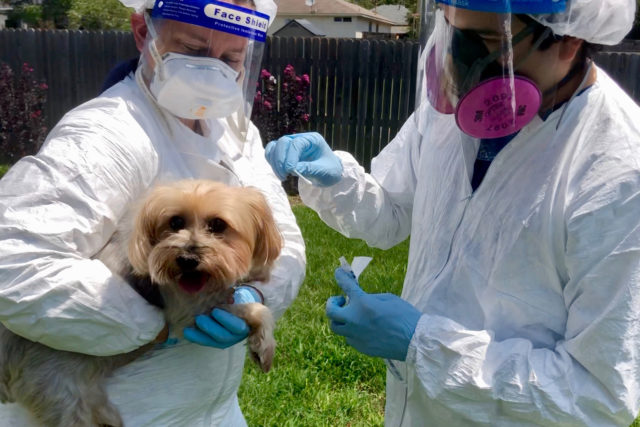Just over a year ago, the first article I ever had to write that mentioned COVID-19 was published in this space. It seems like forever ago, but at the time, dog owners everywhere were panicking at the news that COVID had been found in the pet dog belonging to a human COVID patient in Hong Kong. For a minute or two, there were widely shared reports of dogs and other pets being abandoned in the streets of China.
Fortunately for dogs and the billions of people who live with dogs – not to mention the millions of people who work with dogs (boarding, training, daycare, grooming, walking, veterinary staff, SAR and protection dog handlers, rescue volunteers, etc., etc.) – it developed that the virus that has turned our lives upside-down can infect the pets who live with infected humans, but the infection doesn’t seem to adversely affect them. And there haven’t been any documented cases of COVID-infected pets causing infections in their owners.
However, thanks to ongoing studies being carried out by researchers at Texas A&M University’s College of Veterinary Medicine & Biomedical Sciences (CVMBS), there is growing evidence to support the fact that emerging and increasingly dangerous variants of the virus can not only infect the pets living with human COVID patients who were infected with those variants, they may actually be correlated with myocarditis in some infected pets. Myocarditis is an inflammation of the heart tissue that, in serious cases, can cause heart failure.
According to a March 19, 2021 report in the journal Science, 11 pets (eight cats and three dogs) who had been admitted to animal hospitals in the United Kingdom between December 2020 and February2021 and found to be suffering from myocarditis were found to be infected with the strain of COVID-19 referred to as the United Kingdom variant (B.1.1.7). According to Science: “None of the animals had a previous history of heart disease, yet all had come down with symptoms ranging from lethargy and loss of appetite to rapid breathing and fainting. Lab tests revealed cardiac abnormalities, including irregular heartbeats and fluid in the lungs, all symptoms seen in human cases of COVID-19.
“Seven of the animals got polymerase chain reaction tests, and three came back positive for SARS-CoV-2—all with the B.1.1.7 variant…. SARS-CoV-2 antibody tests on four of the other animals picked up evidence that two of them had been infected with the virus.”
Bringing this news closer to home, last week, researchers in Texas reported that they, too, have found pets who were infected with the B.1.1.7 variant – pets who lived with humans who were also infected with the U.K. strain of COVID. Happily, the Texas pets showed no sign of disease at the time they were tested, though they began to sneeze a week or so later.
According to Texas A&M Today, B.1.1.7 spreads more easily and quickly than other variants and may be associated with an increased risk of death compared to other forms of SARS-CoV-2. “Since its first detection in humans in the United States in December 2020, this variant has now been confirmed in close to 4,000 people in the U.S. across 50 jurisdictions and is predicted to become the country’s dominant viral strain in the coming months.”
As part of the ongoing “Texas A&M COVID-19 & Pets” study, in which researchers go to the homes of people recently diagnosed with COVID-19 to test their pets, more than 450 animals living in the Brazos County area have been tested since June 2020. All the pets lived in a household where at least one human family member tested positive for COVID-19. The goals of the study are to learn more about transmission of SARS-CoV-2 between people and animals, the potential impact of the virus on animal health, and whether animals may be a reservoir for the virus (maintaining the virus in communities). Of the more than 60 animals confirmed with SARS-CoV-2 infection in the study to date, less than a quarter were reported to show signs of disease around the time of the owner’s diagnosis, most commonly including sneezing, coughing, diarrhea, or being less active than normal. To the research team’s knowledge, all symptomatic animals recovered without any need for veterinary care.
But given the ability of the Coronavirus to evolve and develop new variants, some of which may prove to display an increased ability to spread and/or sicken humans and non-human animals, pet owners need to demonstrate continued care to do anything they can to prevent potential transmission of the virus:
- People who are infected with COVID-19 should stay away from pets and other animals, just like they do for other humans, in order to prevent the spread of the virus to animals.
- If contact cannot be avoided, people with COVID-19 should wear a mask around pets and wash their hands before and after interacting with them.
- If you have been diagnosed or think it’s likely that you were infected with COVID-19 and your pet is showing signs of myocarditis or other illness, talk to your veterinarian, who can assess your pet for common illnesses before looking into possible SARS-CoV-2 infection.







At age 87, I contracted Covid-19 in January. I had taken all precautions and have not participated in any friends or family celebrations for the past year. No one can determine how I got the virus. Could it have been from my adorable little dog who I had been taking on daily walks with vigorous off-leash play? He sleeps with me.
There have been ZERO reports of humans contracting COVID-19 from their pets. It’s theoretically possible that if an infected person sneezed on or coughed onto your dog, and you petted the dog not long after, and then touched your face…. It’s pretty unlikely, but not impossible. The CDC offers guidance — as always, it’s about a LOT of hand-washing and mask-wearing. (I’d bring hand-sanitizer to the dog park and sanitize my hands after leashing up my dog and as soon as I got home.) https://www.cdc.gov/coronavirus/2019-ncov/daily-life-coping/pets.html
I’m curious: Did you become very ill? Or have a positive test result without illness?
Respectfully we wish to ask re the last comment; or could the test have been manipulated so that it would appear you got ‘covid’. We hope to God this does not reach the degree that we start pointing fingers at our pets, like a few entities tried to get the world to do last year.
Thank you! Was just composing a similar response. Are they using the faulty pcr tests on the animals too. Ah, but we can create yet another vaccine for our pets too. 1984.
Could this potentially be the reason behind all the hullabaloo about the supposed diet related HCM (hypertrophic cardiomyopathy) they are finding in all sorts of dogs over the last couple years which doesn’t seem to have a link to anything specific, except MAYBE they surmise boutique diets? I had a senior dog on one of these highly suggested to be dangerous diet for 5years +, she ate no other dry food, and her echo showed her heart to be in good shape for a dog her age. She is still going, even though she can hardly walk, has dementia, and is occasionally incontinent. So, even though it’s only anecdotal (my own experience), I am skeptical that boutique diets are behind the rash of old and young dogs dying from heart disease…a COVID variant might make more sense.
Unlikely. The reports of DCM occurring in non-usual breeds goes back several years, to early 2018.
Please read! https://www.sciencemag.org/news/2021/03/major-coronavirus-variant-found-pets-first-time “But the reports offer no proof that the SARS-CoV-2 variant is responsible, nor that it’s more transmissible or dangerous in animals. “It’s an interesting hypothesis, but there’s no evidence that the virus is causing these problems,” says Scott Weese, a veterinarian at the University of Guelph’s Ontario Veterinary College who specializes in emerging infectious diseases.”
You cherry-picked that article.
“So far the impact of these variants on pets has been unclear. Though there have now been more than 120 million cases of COVID-19 around the world, only a handful of pets have tested positive for the original SARS-CoV-2—probably because no one is testing them. Infected pets appear to have symptoms ranging from mild to nonexistent, and infectious disease experts say companion animals are likely playing little, if any, role in spreading the coronavirus to people.
The new variants might change that equation, says Eric Leroy, a virologist at the French National Research Institute for Sustainable Development who specializes in zoonotic diseases. In one of the new studies, he and colleagues analyzed pets admitted to the cardiology unit of the Ralph Veterinary Referral Centre in the outskirts of London. The hospital had noticed a sharp uptick in the number of dogs and cats presenting with myocarditis: From December 2020 to February, the incidence of the condition jumped from 1.4% to 12.8%.
That coincided with a surge of the B.1.1.7 variant in the United Kingdom. So the team—led by veterinarian Luca Ferasin, head of the hospital’s cardiology service—looked at 11 pets: eight cats and three dogs. None of the animals had a previous history of heart disease, yet all had come down with symptoms ranging from lethargy and loss of appetite to rapid breathing and fainting. Lab tests revealed cardiac abnormalities, including irregular heartbeats and fluid in the lungs, all symptoms seen in human cases of COVID-19.”
The fact is that no one yet knows if these newer variants will spread more easily to our pets and whether or not it will have a negative impact on their health. But it certainly seems rather worrisome to me.
As for some of these other comments suggesting that a Covid test may have been intentionally manipulated to show a positive result or that these tests are wrong… My suggestion is for people to start learning science and stop frequenting websites and news organizations that spread conspiracy theories.